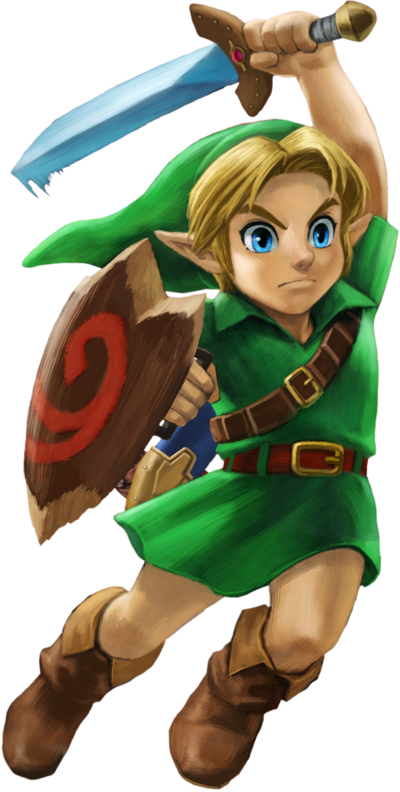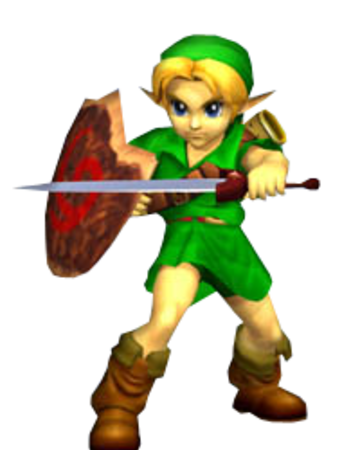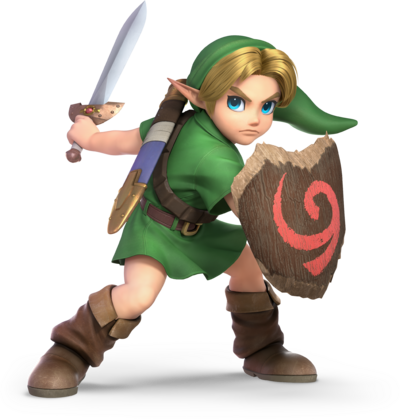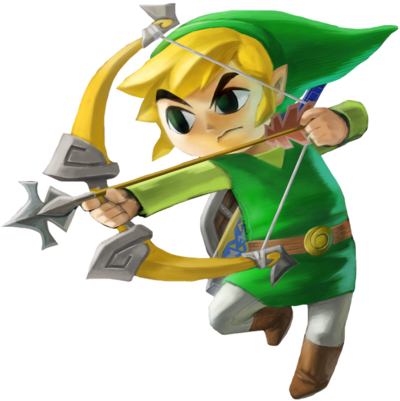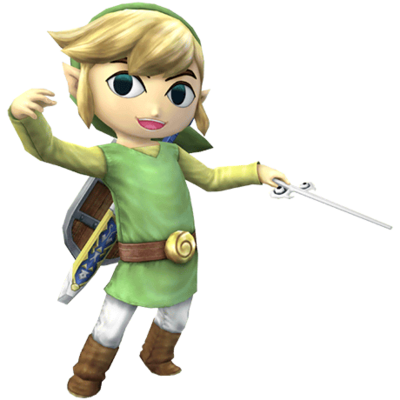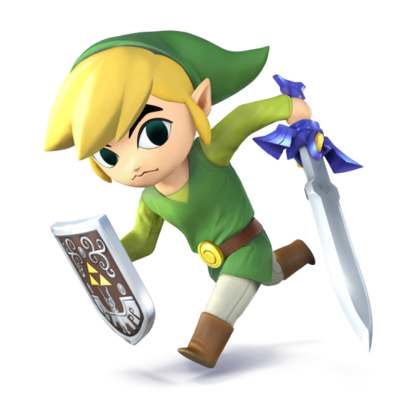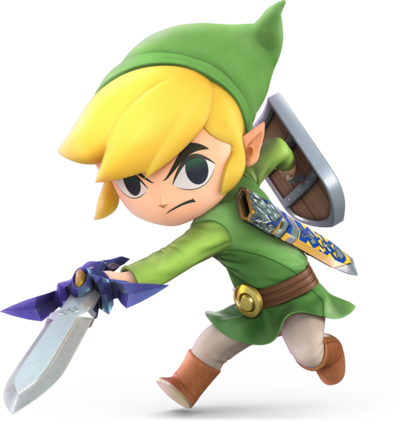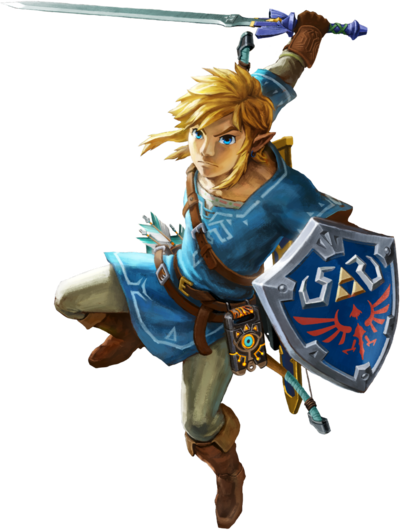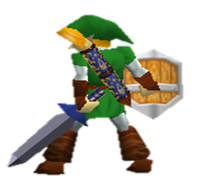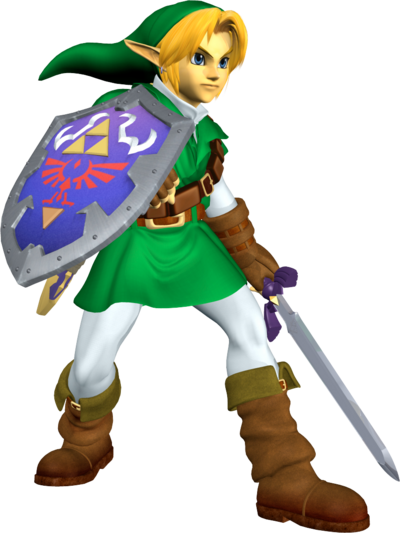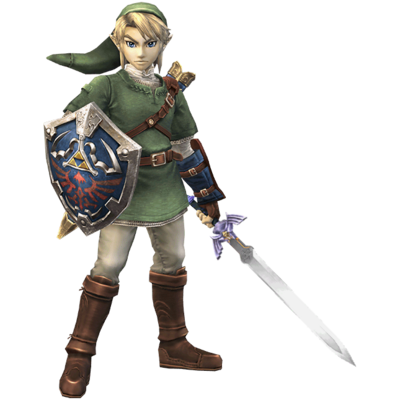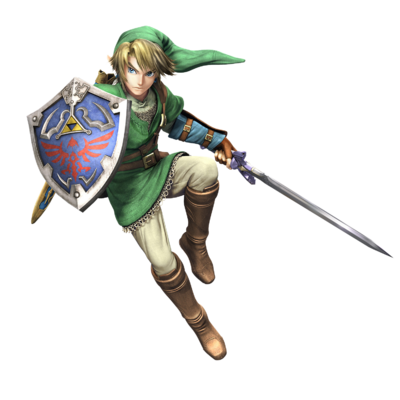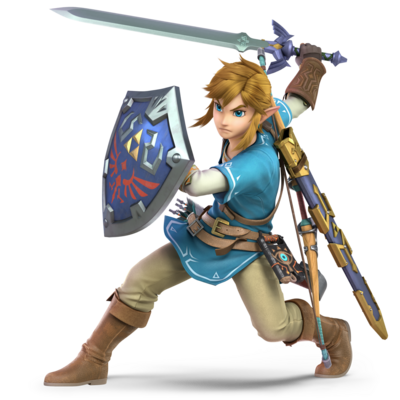The official discord link if you wish to join the discord: https://discord.gg/j5RKwCvAFu
Support the wiki on our official Ko-Fi page or Patreon page!
Link (Smash Bros.): Difference between revisions
GiverOfThePeace (talk | contribs) (clean up and re-categorisation per CFD, replaced: Non-Physical Interaction → Non-Standard Interaction (2)) m |
|||
| Line 82: | Line 82: | ||
==Codex Statistics== | ==Codex Statistics== | ||
'''[[Tiering System|Tier]]:''' '''Unknown''', '''Higher''' with Spirits and Final Smash | '''[[Tiering System|Tier]]:''' '''Unknown''', '''Higher''' with Spirits and Final Smash | ||
'''[[Cardinality]]:''' '''Finite''' | |||
'''[[Dimensionality]]:''' '''3-D''' | '''[[Dimensionality]]:''' '''3-D''' | ||
| Line 105: | Line 107: | ||
'''[[Intelligence]]:''' '''Gifted'''(Can fight skilled swordsman who have dozens of years of experience and is referred to as a skilled swordsman himself. Can fight and defeat [[Master Hand]] who craves to fight against the greatest warriors that have defeated all the prior fighters, is one of the most difficult challenges, with enough skill to perfectly mimic other forms and change up patterns in order to beat the fighter) | '''[[Intelligence]]:''' '''Gifted'''(Can fight skilled swordsman who have dozens of years of experience and is referred to as a skilled swordsman himself. Can fight and defeat [[Master Hand]] who craves to fight against the greatest warriors that have defeated all the prior fighters, is one of the most difficult challenges, with enough skill to perfectly mimic other forms and change up patterns in order to beat the fighter) | ||
---- | ---- | ||
==[[Powers and Techniques]]== | ==[[Powers and Techniques]]== | ||
<tabber> | <tabber> | ||
Revision as of 14:10, 23 June 2024
| Main Timeline | Hero of the Skies - Hero of Men - Hero of the Minish - Hero of the Four Sword - Hero of Four - Hero of Time - Hero of Legend - Hero of Essences - New Hero of Hyrule - Hero of Hyrule - Hero of Twilight - Hero of Light - Hero of the Winds - Hero of Trains - Hero of the Wild |
| Manga Continuity | Ocarina of Time Manga - Oracles Manga - Sir Raven - Four Sword Manga - Minish Cap Manga - A Link to the Past Manga - Phantom Hourglass Manga - Skyward Sword Manga - Twilight Princess Manga |
| Alternate Links | Hyrule Warriors - Cadence of Hyrule - Game & Watch - Shadow Link - Dark Link - Linkle - Hero of Hyrule (BS-X) - Hero of Light (BS-X) |
| Non-Canon Media | Valiant Comics - Dark Horse Comics - DIC - CD-i - Soulcalibur - Smash Bros. |
| Composite | Spirit of the Hero - Composite |
Background
Link is the protagonist of The Legend of Zelda series. Unlike the majority of Nintendo protagonists, there are several distinct incarnations of Link seen throughout The Legend of Zelda series, each of whom are destined to become heroes against powerful forces of evil, most notably Ganondorf/Ganon. Due to the consistent critical and commercial success of The Legend of Zelda series, Link is marketed as one of Nintendo's flagship characters alongside Mario, the company's mascot, to the point that both he and Mario are marketed together as mascots for Super Smash Bros. Ultimate.
As a member of the "perfect-attendance crew", Link has been featured as a playable character throughout the Super Smash Bros. series. Compared to the rest of the crew, however, he holds the distinction of doing so in name only because of three of his incarnations (the Hero of Time, the Hero of Twilight, and the Hero of the Wild) appearing as playable characters. By extension, prepubescent incarnations have also been playable, with the first instance of this occurring in Super Smash Bros. Melee.
| This dropdown contains the synopsis of Link’s story. Read at your own risk as you may be spoiled otherwise! |
|---|
|
Link's first appearance was in The Legend of Zelda, which depicted his quest to rescue Princess Zelda and the land of Hyrule from the evil Ganon. Link is designed with a green tunic and a green hat, which, like Mario's design, was due to the NES' hardware limitations. This appearance has since been traditional for Link, with the exception of his appearance in Breath of the Wild, which nevertheless features versions of his traditional green clothes as unlockable attires. It is worth noting that while there have been multiple games within The Legend of Zelda series, it has not always been the same Link who the player controls. This is evident with the fact that are there multiple timelines within the series, wherein many games typically feature a new Link with a new origin. Notable examples include "Hylia's Chosen Hero" (referring to the Link from Skyward Sword), the "Hero of Time" (referring to the Link from Ocarina of Time/Majora's Mask), the "Hero of Winds" (referring to the Link from The Wind Waker/Phantom Hourglass), and the "Hero of Twilight" (referring to the Link from Twilight Princess). On a related note, Link's age has also varied. In some games, such as The Wind Waker and the present timeline of Ocarina of Time, Link is a child, with these two particular incarnations being represented as playable characters in the Super Smash Bros. series. In Skyward Sword, Zelda II: The Adventure of Link, Breath of the Wild, Twilight Princess and the future timeline of Ocarina of Time, Link is depicted as a teenager, with the incarnations from the latter three games also being playable characters in the Super Smash Bros. series. In addition, Link, regardless of his age, almost always starts out as unremarkable until learning of his heroic destiny and, as his journey presses onward, gradually progresses into a full-fledged hero. For example, Ocarina of Time features him as a young boy whose mother entrusted him in the care of the Great Deku Tree before dying. The Wind Waker also features him as a young boy, albeit living a happy and carefree life on Outset Island alongside his grandmother and younger sister Aryll. In Twilight Princess, he is an ordinary young man working at Ordon Ranch. Breath of the Wild is one of the few exceptions to this rule, introducing him as a knight and a descendant of many other knights. Regardless of his origin, each incarnation of Link is tasked with defeating the main antagonist of the story, most frequently Ganondorf/Ganon, in order to stop them from either taking over the world or, in other cases, destroying it. Other hallmarks shared by the Links are their ability to wield the Master Sword and their possession of the Triforce of Courage, although these are not depicted universally. Due to the The Legend of Zelda series giving Link simple and concise answers that the player can pick instead of traditional dialogue, there is very little insight into the personalities of the majority of his incarnations. While the only incarnations to expressively show distinct personalities are the ones from Ocarina of Time/Majora's Mask, The Wind Waker/Phantom Hourglass, Twilight Princess, Spirit Tracks, Skyward Sword, and Breath of the Wild, universal traits among Link's incarnations are bravery, humility, and politeness. |
General Information
Name: Link, Young Link, Toon Link
Origin: Super Smash Bros. Originally from The Legend of Zelda
Sex: Male
Age: Unknown
Classification: Smash Fighter, Trophy Fighter, Swordsman, Legendary Hero
Species: Hylian
Occupation: None
Status: Alive, Deceased in the Galeem and Dharkon endings (Died in the Galeem and Dharkon endings)
Alignment: Neutral Good (Aided in the defeat of Galeem and Dharkon who were trying to eradicate the universe in either light or darkness respectively)
Codex Statistics
Tier: Unknown, Higher with Spirits and Final Smash
Cardinality: Finite
Dimensionality: 3-D
Attack Potency: Unknown (Can fight and defeat Master Hand, fought and defeated Tabuu with the rest of the cast who one-shotted Master Hand and whose defeat caused the subspace realm to be destroyed the subspace realm contains worlds from the world of trophies including objects like the subspace gun which can infinitely render space. Fought Galeem and Dharkon the former of who commands hundreds of Master Hands. Master Hand Is the creator of the Smash Bros. universe, his equal Crazy Hand is the personification of destruction in the Smash Bros. universe. Is the link between the real world and the imaginary world of the Smash Bros. Universe. The Smash Bros. universe is the "World of Imagination", being noted to be imaginary in comparison to reality[1]. With the lower reality being this large), Higher with Spirits and Final Smash (Spirits are used to power up smash characters and are the very thing that aided them to defeat Galeem)
Durability: Unknown (Blocked Galeem's beams, can tank hits from Tabuu & Master Hand), Higher with Spirits
Striking Strength: Unknown, Higher with Spirits
Lifting Strength: Below Average Human (Comparable to King Dedede who can swing his hammer at massive force)
Travel Speed: Superhuman (Can travel around the World of Light map in a short timespan), Higher with Spirits
Combat Speed: Faster Than Light (Can tag Mario who can tag Kirby, who avoided beams from Galeem's, which can reach alternate space-times and separate time periods), Higher with Spirits
Reaction Speed: Faster Than Light (Was capable of blocking Galeem's beams before being overwhelmed, can spot dodge light based attacks), Higher with Spirits
Stamina: Peak Human (Can fight with up to 7 opponents at once without shows of being tired), higher with Spirits
Range: Extended Melee Range, Several Meters with Boomerang, Hundreds of Meters with Bow & Arrow, Tens of kilometers with projectiles.
Intelligence: Gifted(Can fight skilled swordsman who have dozens of years of experience and is referred to as a skilled swordsman himself. Can fight and defeat Master Hand who craves to fight against the greatest warriors that have defeated all the prior fighters, is one of the most difficult challenges, with enough skill to perfectly mimic other forms and change up patterns in order to beat the fighter)
Powers and Techniques
Resistance to Energy Projection (With his shield he can block various energy attacks, was capable of even blocking Galeem's beams for a little while), Empathic Manipulation & Madness Manipulation (Type 2; Doesn't turn mad or go sad from Floow's screams), Ice Manipulation (Can break out of freezies)
Resistance to Fire Manipulation & Explosion Manipulation (Via Fire/Explosion Resist, reduces damage taken from explosion and fire attacks), Weapons (Via Weapon Resist, decreases damage taken from melee weapons like swords and whips), Blunt Force Trauma (Via Sprinting Endurance, makes it harder to be launched while running, airborn endurance, makes it harder to be launched when in the air)
Resistance to Aura (Via Aura Resist, reduces damage taken from Lucario's Aura attacks), Magic (Via Magic Resist reduces damage taken from magic attacks, such as Zelda's and Robin's spells), Psychic Powers (Via PSI Resist, reduces damage taken from Ness's and Lucas's PSI attacks), Fire Manipulation, Explosion Manipulation & Darkness Manipulation (Via Fire/Explosion Resist, reduces damage taken from explosion and fire attacks, also applies to darkness based attacks), Water Manipulation & Ice Manipulation (Via Water/Ice Resist, reduces damage taken from water attacks), Electricity Manipulation (Via Electric Resist, reduces damage taken from electricity attacks), Energy Manipulation (Via Energy Resist, reduces damage taken from energy attacks, such as Fox's Blaster), Poison Manipulation (Via poison immunity, poison heals heals the user when they're poisoned), Extreme Heats (Via lava-floor immunity), Extreme Colds (Via ice-floor immunity), Paralysis Inducement (Via zap-floor immunity), Sleep Manipulation (Via slumber-floor immunity), Air Manipulation (Via strong-wind immunity), Smoke Manipulation (Via Fog Immunity), Spatial Manipulation (Via screen-flip immunity), Status Effect Inducement (Via Irreversible Controls Immunity), Gravity Manipulation (Via Gravity Change Immunity), Earth Manipulation (Via Falling Immunity, grants immunity to tripping from earthquakes), Burrowing (Via Bury Immunity)
Equipment
Kokiri Sword, Master Sword, Bow & Arrow, Boomerang, Gale Boomerang, Bombs, & Hookshot
Optional Equipment
| Item | Description |
|---|---|
| Assist Trophy | When picked up, after the character lands on the ground, they will perform a short animation and summon a random character to aid them in the fight. |
| Back Shield | Defends the wearer from attacks towards their back. |
| Banana Gun | Ejects the banana out of the peel and the player is left with the banana peel after using it. |
| Banana Peel | Once thrown, trips opponents that touch it. |
| Barrel | Once thrown, struck, or landed on a slope, may roll across the stage and damage what it hits before breaking. Has a one-in-eight chance of exploding. |
| Barrel Cannon | Once thrown or it lands on a hill, grabs and launches the first character it hits. Disappears very quickly. |
| Beam Sword | Starting in Melee, gets longer when swung depending on character. Peach has a rare chance of plucking one when using Vegetable. |
| Beastball | Reappears near an opponent after being thrown and targets them, covered in flames. |
| Beehive | Can be thrown at opponents. If attacked or thrown at a player, it summons bees that attack the player that attacked it or was hit by it. |
| Beetle | Can be thrown towards an opponent, and the item will grab the opponent and fly off into the air with them. Can be reversed by hitting it. |
| Black Hole | Creates a massive black hole, dragging all items and players nearby in. Throws the opposite side of user's orientation. |
| Blast Box | Very poor throwing distance. Explodes upon taking 30% damage or a flame attack. |
| Bob-omb | Very powerful explosive. If not grabbed within a few seconds of its appearance, it lights its own fuse and begins walking around, exploding on any character it meets. If it doesn't meet a character it will blow itself up after a while. Peach has a rare chance of plucking one when using Vegetable. |
| Bombchu | Can move up walls and across floors and ceilings. Explodes on contact with opponent. |
| Bomber | Explodes in the player's hand when used. Only affects enemies. |
| Boomerang | Can be thrown at and grabbed by opponents. Returns to the thrower unless intercepted. Gains power when caught. |
| Boss Galaga | Carries foes upward to the top of the screen. Can be destroyed by attacking it. |
| Bullet Bill | Transforms the user into a Bullet Bill and launches them in a specified direction, dealing big damage to anyone they hit along the way. After a set distance, the user returns to normal. Can be reflected. |
| Bumper | Can be placed on the stage or (starting in Brawl) set in midair, where it will knock away characters that touch it. If two or more are present, they can be used to momentarily trap characters by bouncing them back and forth. |
| Bunny Hood | Increases the user's movement speed, jump height, and falling speed. |
| Capsule | Contains a single item. Has a one-in-eight chance of exploding. |
| Cloaking Device | Renders the user mostly invisible and makes them immune to damage (but not knockback). |
| Cracker Launcher | Shoots explosive fireworks. Limits the user to walking and a single jump, and automatically dropped from any flinch. |
| Crate | Contains many items. Has a one-in-eight chance of exploding when thrown, or hit with enough force to break. |
| Cucco | Can be thrown at opponents. If attacked or thrown at a player, it summons various Cuccos that attack the player that attacked it or was hit by it. |
| Daybreak | Appears in three pieces that must be collected all at once; characters can lose pieces from their possession when hit or KO'd. Once one character has all the pieces the weapon assembles in their hands, which they can then use at their discretion to fire a giant laser across the stage, almost guaranteed to KO anyone it hits. |
| Death's Scythe | Instantly KOs opponents at high percentages. |
| Deku Nut | When thrown, damaged, or after a short time (even if held), nearby characters are stunned (if grounded) or launched (if aerial). |
| Dragoon | Appears in three pieces that must be collected all at once; characters can lose pieces from their possession when hit or KO'd. Once one character has all the pieces the Dragoon is assembled and flown into the stage for a one-hit KO ram attack. |
| Drill | Allows the wearer to fire a large drill. |
| Fairy Bottle | Recovers an excess of 100% damage, but only if the user's damage is 100% or more. Otherwise, can be thrown, but will heal anyone hit who meets the prior requirement. |
| Fake Smash Ball | Flies around the stage, similar to the Smash Ball. Characters can break it in order to activate. Once broken, it will explode. |
| Fan | Fastest-swinging battering item. High shield damage. |
| Fire Bar | Causes fire damage. Grows shorter with each successful attack. |
| Fire Flower | Produces a continuous stream of short-range fire. |
| Flipper | Once thrown, halts in the air and bops characters that run into it. |
| Food | Each type of food recovers a different amount of damage. Can be produced in large numbers by Peach Blossom. |
| Franklin Badge | Temporarily makes the wearer immune to projectiles by automatically reflecting them. Can be knocked off. |
| Freezie | Slides across the stage, freezing characters when struck by it. Can be destroyed before being picked up. |
| Golden Hammer | Acts the same as the regular Hammer, though faster, more powerful and with the ability to float. May be a dud Squeaky Hammer that deals no damage at all. |
| Gooey Bomb | When thrown, attaches to characters and can transfer to other characters that pass by. Explodes after a certain time or if attacked when not on a character. |
| Grass | When picked up, another item appears in its place. |
| Green Shell | When thrown, attacked, or landed on, slides across the stage and damages everything it hits. Can be stopped by jumping on it. |
| Gust Bellows | Blows gusts of wind at other players to push them away. |
| Hammer | One of the most feared items in the game due to its range, damage, and knockback. However, it limits the user to walking and a single jump; the user cannot even choose to drop the item. May randomly lose its head and become useless. |
| Healing Field | Can be thrown on the ground. Once thrown, it will open up and will heal anyone standing on it. |
| Healing Sprout | Sticks to fighters and gradually heals them. Can be transferred on contact like the Gooey Bomb. |
| Heart Container | Strongest recovery item, recovering up to 100% damage (in the original Super Smash Bros., it can reset player health to 0%). |
| Hocotate Bomb | A bomb shaped like the Hocotate Ship that will fly off, and then crash down after a set time. |
| Home-Run Bat | An extremely powerful item. Its forward smash is among the most powerful attacks in all four games, being a one-hit KO in every one. As a throwing item, it maintains its high knockback and is a semi-spike. In Brawl, forward smash uses a unique animation. It becomes stronger when hit on the tip. |
| Hothead | Follows the contours of the stage once thrown. Grows in size and damage but lasts for a shorter time when hit by flame or electric attacks. |
| Killer Eye | When placed, can fire energy beams in the direction it faces. Hitting it flips it around. |
| Killing Edge | A sword that deals x2 more damage and knockback when glowing. |
| Lightning Bolt | When touched, shrinks all opponents. Can backfire and shrink the user or enlarge all opponents. |
| Lip's Stick | Flowers opponents. Has a limited supply of short-range spore projectiles produced on f-tilt or f-smash. |
| Master Ball | Just like the Poké Ball, but it is guaranteed to release a rare or Legendary Pokémon. |
| Maxim Tomato | The third most powerful recovery item, healing up to 50% damage (in the original Super Smash Bros., it can heal up to 100% damage). |
| Metal Box | Turns the user metallic, increasing their weight and falling speed, while also reducing the chances of flinching. Can be activated by pickup or by direct attack; indirect attacks will either destroy it (in Melee) or do nothing (other games). |
| Motion-Sensor Bomb | Attaches to the stage once thrown; characters that approach it after a short time cause it to explode. |
| Mr. Saturn | Walks around the stage and can be knocked about by attacks. Deals massive damage to shields when thrown, but only minor damage otherwise. |
| Ore Club | An extremely powerful club made of stone that produces tornadoes when swung. Grants super armor when used as a forward smash. |
| Parasol | Reduces the holder's falling speed, allowing them to glide slowly left and right, potentially improving recovery. |
| Party Ball | Once activated by being thrown or damaged, it floats into the air and opens, dropping its items. |
| Pitfall | Embeds itself into the ground once thrown; characters that approach it after a short time will be buried or Meteor Smashed. Can also be thrown at an opponent directly for the same effect. |
| Poison Mushroom | Slides across the stage. When touched, shrinks the character. |
| Poké Ball | Once thrown and lands on the ground, unleashes a Pokémon to aid the user. |
| POW Block | When thrown, it causes an earthquake, launching all characters (including the player) straight up if on the ground. Can be used three times. |
| Rage Blaster | Fires a blast of energy. The higher the percent a user has, the more damage it does. |
| Ramblin' Evil Mushroom | A mushroom will grow on the opponent's head, reversing the left and right controls. |
| Ray Gun | Fires blasts of energy that have infinite horizontal range. |
| Red Shell | When thrown, attacked, or landed on, slides across the stage and damages everything it hits. Aims for nearby characters and avoids sliding off edges. |
| Rocket Belt | Can be equipped and used to increase upward momentum at will, similar to R.O.B.'s up-special. |
| Rolling Crate | When thrown, struck, or landing on a hill, it will roll across the stage and damage what it hits without breaking, though it will break with enough force. Can be stood on. |
| Sandbag | When attacked, produces items. |
| Screw Attack | Turns the holder's jumps into Screw Attacks. In Melee, applies for as long as the holder keeps the item, and a forced Screw Attack will be applied to those the item is thrown at. In Brawl, applies until the item wears off and does not need to be held in-hand once picked up. |
| Smart Bomb | Produces a large explosion when thrown or attacked. Has a chance to be a dud, though it can still explode if hit or thrown again. |
| Smash Ball | Flies around the stage. Characters must break in order to obtain. Once broken, player presses their neutral special button to use their Final Smash. Will fly off-stage after a short period if not obtained and used. |
| Smoke Ball | Once thrown, spews smoke around its immediate area. May stick to opponents. |
| Soccer Ball | Cannot be picked up. When attacked, it careens in the knockback direction with high damage and knockback. |
| Special Flag | Can be held above the user's head for a long period to gain either a KO point in a timed match or a stock in a stock match. Unlike other items, this one will always be dropped if the user is hit while holding it. |
| Spiny Shell | Commonly known as the 'Blue Shell'. Hovers above a player before dropping onto them and exploding. Can be dodged, or it can hit someone other than its intended target on descent. |
| Spring | When idle, repels characters when touched depending on whether it is upright or sideways. |
| Staff | Shoots a beam. The farther the opponent is, the more damage it deals. |
| Star Rod | Has a limited supply of long-range star shots produced on f-tilt or f-smash. |
| Steel Diver | A smaller gun-like version of the Steel Diver from the self-titled game for the Nintendo 3DS. Fires a torpedo which travels slowly at first. Deals no shield damage whatsoever. |
| Super Launch Star | Can be set in midair, where it will attract and launch any characters that get too close to it. The launch has the potential to KO fighters. |
| Super Leaf | Gives the user raccoon ears and tail. Allows the user to float in mid-air using the jump button. |
| Super Mushroom | Slides across the stage. When touched, enlarges the character. |
| Super Scope | Can shoot a total of 48 small rapid-fire pulses of energy or charge 3 large blobs of energy. |
| Super Star | Bounces across the stage, and makes whoever it touches invulnerable to all damage and knockback for a short time. Users can still be KO'd if they fall off the stage with it. |
| Superspicy Curry | Causes the user to constantly shoot short-range fireballs and be incapable of walking slowly. |
| Team Healer | Heals teammates when thrown at them. When thrown at opponents, can heal or damage them at random. Only appears during team battles. |
| Timer | Slows down all opponents. Can backfire and slow down the user, or slow down the entire game. |
| Unira | Attaches to the stage once thrown or attacked and pokes opponents that come near. Can be set or reset with a direct attack; indirect ones do nothing. |
| Warp Star | Once picked up, the user flies into the sky and then crashes down with an explosion. Can be steered slightly, and if there are platforms above, will land there instead of the starting point. |
| X Bomb | Creates a cross-shaped explosion that spans most of the screen. |
Notable Techniques
Basic Attacks
- Triple Stab: A vertical slash, a horizontal slash, and a stab. If the attack is button mashed, the third hit will be replaced by a series of rapid jabs that can angle diagonally upwards, straight, and diagonally downwards.
- Foward Chop: A delayed downward swing. Somewhat slow but above average damage and knockback for a forward tilt.
- Half-Moon Slash: Quickly swings the Master Sword in a small arc above him. Can be chained together and good for leading into combos, usually forward tilt or neutral aerial. The attack's trajectory is based on where they are positioned on hit; when facing right, there's a slight right angle, and vice versa. This move can usually KO a foe reliably above very high damages such as 200%. Changes heavily in Japanese version of Smash 64, doing 15% damage and being able to shield break and a better angle for combos.
- Grasscutter: A ground-level slash. Usually knocks foes upwards. At lower percentages, this can be followed by a forward smash, a forward tilt, or even a grab. At high percents, it loses combo potential due to sending opponents too far for a follow-up.
- Dash Thrust: Comes to a stop mid-dash, stabbing in front of himself. Good range and speed, and can KO usually around 150%. Great for combo finishers. Moderate ending lag.
- Smash Slash: Twirls his sword twice in hand, then slashes downward in a similar fashion to his forward tilt, but with more power and lag. Much stronger if hit with the main blade, with very good knockback.
- Triple Slash: Three quick, narrow slashes while looking upwards. Lacks range but good for damage racking, as long as the foe doesn't DI out of it. Best suited for heavier characters. This move is somewhat weak for KOing, but at lower percentages it can lead into itself, an aerial, or Spin Attack. In most other cases, an up aerial or simply some other juggling plan (usually a Bomb readied before the move) is recommended.
- Foward and Backward Slash: Swiftly slashes in front of himself, then behind. A good close-range defensive move but also effective for KOing. This move is one of Link's few moves that come out near-instantaneously, and the ending lag is also rather low. Assuming Link is facing right, when the foe is hit on either side while being closest to Link, they will be sent upwards at a slightly angled trajectory. When hit at the end of Link's blade, it'll knock the foe in a 45° angle in the direction depending on what side they were hit on.
- Link Kick: An aerial kick. Best used as a defensive move due to its speed and lack of KO power. Moderately good combo move, and effective for edge-guarding.
- Forward Cleave: Does a swirling slash in a complete circle. Has two hitboxes: the early hit does 20% damage with a good amount of knockback, while a late hit deals less damage, but keeps its decent strength. It is not possible that the two hits will combine into each other. It is used competitively to end combos due to its knockback.
- Double Kick: Two kicks behind himself. They combo into each other for a good amount of knockback, though the second hit can be DI'd out of. In addition, it is risky to use this move near a ledge due to the length of this move, as Link's recovery may not always be good enough to make it back to the stage. Very useful for combos.
- Up Thrust: Stabs upward, similarly to his Up Thrust from Zelda II: The Adventure of Link. Decent KO power, can also juggle. Link's blade carries the move's hitbox. Useful on platforms to extend combos.
- Down Thrust: Aims his sword directly below him for a long duration, similarly to his Down Thrust from Zelda II: The Adventure of Link. This has great horizontal knockback. It is possible to hit the same enemy twice to have this move inflict 32% altogether. This move can be used to KO recovering foes by jumping directly at them, but this is only safe if the bounce of the connected hit allows Link to return to the stage. It should be noted that this move's downwards descent can be hastened by fast falling, although doing so is unwise near ledges. Has substantial landing lag when the player lands on the ground while using the move if not Z-cancelled. Usually considered to be Link's best aerial for shield pressure when Z-cancelled. Used competitively to end combos due to its knockback. Along with Pikachu's, this is the only down aerial in SSB to lack a meteor smash hitbox.
- Floor Recovery: Slashes on both sides and gets up.
- Edge Recovery (Fast): Flips over and slashes outwards. Decent range.
- Edge Recovery (Slow): Slowly picks himself up and stabs at a slight upward angle.
Grabs
- Hookshot: Uses the Hookshot while standing. Link, along with Samus and Yoshi, has an "extended grab". This allows him to grab opponents from a distance, but the grab is very laggy if it misses. This can lead to various unique combos due to Link's high grab range.
- Kick Off: Kicks his foe forward with good power. Often throws the foe far enough to set up a quick boomerang or bomb-based edgeguard, or simply one of Link's aerials.
- Reverse Kick Off: Takes the foe and kicks them directly behind him. Somewhat better KO power than his forward throw.
Specials
- Boomerang: Throws a blue boomerang, which returns after a set distance. One of Link's two projectiles. Doing a "smash throw" (smash the Control Stick forward while pressing B; similar to performing a smash attack) increases the distance the boomerang can travel. The Control Stick can be tilted up or down to aim the boomerang's trajectory. Can edgeguard, and can be used during combos if Link is a distance away from the opponent, as the hitstun caused by it allows Link to continue his combo.
- Spin Attack: Performs his signature Spin Attack. A powerful attack, especially on the ground; when grounded, the spin creates a wide, orange magic circle that grants the move more range. However, it is generally terrible for recovery, as it covers a very short distance; this gives Link a predictable recovery, and is often cited as the main reason why he is in bottom tier, as he is very easily edgeguarded by most characters, especially Pikachu and Kirby.
- Bomb: Pulls out a bomb, which functions as an item that explodes on contact with an opponent or after its fuse runs out. Link's second projectile. There are many techniques that can be performed with bombs, which can be read about here. Though difficult to time, the hitstun caused by the bomb allows Link to force himself out of helplessness to attempt recovering again.
Basic Attacks
- Neutral attack: A diagonal sword slash followed by a horizontal slash, with a lunging stab finisher. If the player mashes the A button enough, Link will initiate a rapid stab attack that deals low knockback.
- Forward tilt: Brings sword down, in an axe-like fashion. This attack has relatively high knockback for a forward tilt. Since the hitbox is high, Link can hit midair opponents with it.
- Up tilt: Swings his sword in an arc above himself. Among Link's most flexible moves on the ground, it has good combo potential, it is rather fast with minimal ending lag, and it has good knockback.
- Down tilt: Swipes sword across ground in front of him. The move can lead into an aerial attack, though this is somewhat predictable. This move can also strongly meteor smash a ledge-grabbing foe when the inner part of Link's sword makes contact, though this is highly situational.
- Dash attack: Swings sword from head to toe while coming to a stop. Somewhat fast, though it has some ending lag. At higher damages it will knock a grounded foe into the air, often leading into an aerial follow up, though it doesn't have much KO power. At mid-percent it has high combo potential, often leading to another dash attack or an up-tilt, into potentially more moves.
- Sword Slice: Swings sword once in front for good knockback by itself, and if the A button is pressed again, he will do a much more powerful slash to follow. The second hit deals more vertical knockback than the first. It is impossible that the second hit will land at damages above 30% or so due to knockback growth of the first hit. The first hit is still strong, though, not as much as the second one. Its possible to land a second hit without the first hit, but it requires perfect timing. Interestingly, the second slash does not increase in damage or knockback whenever it's "charging".
- Up smash: Slashes in an upwards arc three consecutive times. This attack was taken from Smash 64, but with changes to the hitbox. All hits now have a noticeable arc above him with good range, instead of just the first hit being an arch and two smaller stabs upwards as in Smash 64. Good for racking up damage and setting up for air combos due to below average knockback for an up smash. All three hits can deal up to ≈14.92% when used fresh (though is says 15% when first used in-game). It is also notably the fastest upsmash in the game, which makes it a situational anti-air and out of shield option.
- Down smash: Sweeps with his sword in front of and then behind him. The first hit comes out fast, though the second hit has some lag. This move has decent range, and since the hitbox is on the floor, it makes this move good for spacing, and has some KO power. It is often used to cover multiple options in tech chases, due to the two hits coming out on different sides.
- Neutral aerial: A generic kick; very fast, with low ending and landing lag, making it a good SHFFL option. Its long duration and moderate knockback also make it one of Link's best edgeguarding tools, especially coupled with his decent air-speed. The late hit is uniquely active for the rest of the animation length, even after Link retracts his legs.
- Forward aerial: Swings his sword forward twice while spinning 360 degrees. The first hit is usually hard to follow into the second hit. The first hit is relatively safe on shield when well spaced and has decently high knockback that make it a decent kill option. The second hit comes out very late and as a result is nearly impossible to have come out in a short hop, and has less knockback. Since it is rather laggy, it's rather situational for edgeguarding, but is commonly used after up throw vs fast-fallers as a kill option.
- Back aerial: Two short-ranged back kicks behind himself. The properties of the first hitbox make it difficult to directly segue into the second. This move, unlike most back aerials, is not always considered Link's best viable choice for edgeguarding due to awkward hitboxes and duration, along with relatively low knockback.
- Up aerial: Thrusts his sword upwards. Good for juggling, and it acts as a reliable vertical finisher at higher damages ~120%. Has some sex kick properties, and extremely fast to come out, although also very laggy.
- Down aerial: His famous aerial from Zelda II where he takes his sword and thrusts it downward. This move is a move of extremes: huge knockback, huge ending lag, and huge hitbox. It is possible to hit more than once with this move on the same foe. If the move is still in action when Link lands, he must pull it from the ground, with among the highest ending lag in the game; as such, the move can be risky, though L-canceling substantially reduces its lag, giving it slightly as much cool-down time as an ordinary smash attack. It is one of his primary KO moves, and it can KO reliably starting at 80% to 90%. It is generally not used much outside of a combo from Boomerangs, Bombs, or either up-throw or down-throw.
- Floor Attack: Quickly gets up and slashes on both sides.
- Edge attack (fast): Pulls himself up into a front flip and slices downward.
- Edge attack (slow): Slowly gets up and quickly thrusts his sword. Only the sword has a hitbox; foes close to the end of the ledge Link was on can avoid the attack completely.
- Hookshot: The attack has the unusual property of not suffering from the stale-move negation. With low damage, knockback and hitstun, as well as long lag, the move has relatively little use outside of being used for recovery, though its long range can potentially catch opponents off-guard, and it benefits from Link's small short hop. This attack has transcendent priority.
Grabs
- Hookshot: Uses his Hookshot to grab at foes from afar. It's the second longest grab in the game, behind Samus.
- Pummel: Hits opponent with the hilt of his sword.
- Forward throw: Kicks foe a short distance in front of him. Low knockback.
- Back throw: Throws the opponent behind him and kicks them away.
- Up throw: Raises the opponent above him and slashes upward. Has below-average knockback, allowing it to potentially combo into an up-tilt, up-smash, down-smash, or several different aerials.
- Down throw: Takes the opponent onto the ground and elbow drops them. Leaves foes wide open for a combo, such as his Spin Attack or u-tilt. Generally Link's best kill confirm at high percents where it can easily combo into Spin Attack.
Special
- Bow: Link takes out his bow and shoots an arrow. Although a bit laggy and travels fairly slowly, Link can increase the speed and damage of the arrow by holding down the B button. Sticks in shields and the ground. Has its own hurtbox that can be hit by other attacks. Can shoot through opponents or hit twice if stale and used at point blank range.
- Boomerang: Link throws a Boomerang. Deals fair knockback, Link's Boomerang's distance can be extended or have its trajectory altered with the control stick. Only one Boomerang can be on the field at a time unless it is reflected. It is a relatively strong combo starter.
- Spin Attack: Does a spinning attack swinging his sword around him, with different properties depending on if it's used on the ground or in the air. In the air, the initial hits have low knockback, but the last one has a much stronger knockback than the rest. Although an unspectacular recovery, the grounded variant can be dangerous as an offensive move, especially an edgeguarder. It deals high knockback and can send opponents in a lower diagonal trajectory, a semi-spike (not in PAL versions of the game). It is easily combo'd into using Link's down throw versus many different characters and is one of his best kill moves. Link can grab an edge backward with his Spin Attack, unlike most recovery moves, but only during the move. This attack has transcendent priority.
- Bomb: Link takes out a bomb. Then, he can throw it like any other item. The bomb eventually explodes on its own, even being able to damage Link himself. Oddly, anyone who comes in contact with the bomb will have an explosive effect on their bodies, despite the bomb not detonating. The explosion can grant Link an extra Spin Attack if used skillfully, along with several of his other kill moves link forward-air, forward-smash, or his otherwise risky down-air.
Basic Attacks
- Neutral attack: A diagonal sword slash followed by a horizontal slash, with a lunging stab finisher. If the player mashes the A button enough, Link will initiate a rapid stab attack that deals low knockback.
- Forward tilt: Brings sword down, in an axe-like fashion. This attack has relatively high knockback for a forward tilt. Since the hitbox is high, Link can hit midair opponents with it.
- Up tilt: Swings his sword in an arc above himself. Among Link's most flexible moves on the ground, it has good combo potential, it is rather fast with minimal ending lag, and it has good knockback.
- Down tilt: Swipes sword across ground in front of him. The move can lead into an aerial attack, though this is somewhat predictable. This move can also strongly meteor smash a ledge-grabbing foe when the inner part of Link's sword makes contact, though this is highly situational.
- Dash attack: Swings sword from head to toe while coming to a stop. Somewhat fast, though it has some ending lag. At higher damages it will knock a grounded foe into the air, often leading into an aerial follow up, though it doesn't have much KO power. At mid-percent it has high combo potential, often leading to another dash attack or an up-tilt, into potentially more moves.
- Sword Slice: Swings sword once in front for good knockback by itself, and if the A button is pressed again, he will do a much more powerful slash to follow. The second hit deals more vertical knockback than the first. It is impossible that the second hit will land at damages above 30% or so due to knockback growth of the first hit. The first hit is still strong, though, not as much as the second one. Its possible to land a second hit without the first hit, but it requires perfect timing. Interestingly, the second slash does not increase in damage or knockback whenever it's "charging".
- Up smash: Slashes in an upwards arc three consecutive times. This attack was taken from Smash 64, but with changes to the hitbox. All hits now have a noticeable arc above him with good range, instead of just the first hit being an arch and two smaller stabs upwards as in Smash 64. Good for racking up damage and setting up for air combos due to below average knockback for an up smash. All three hits can deal up to ≈14.92% when used fresh (though is says 15% when first used in-game). It is also notably the fastest upsmash in the game, which makes it a situational anti-air and out of shield option.
- Down smash: Sweeps with his sword in front of and then behind him. The first hit comes out fast, though the second hit has some lag. This move has decent range, and since the hitbox is on the floor, it makes this move good for spacing, and has some KO power. It is often used to cover multiple options in tech chases, due to the two hits coming out on different sides.
- Neutral aerial: A generic kick; very fast, with low ending and landing lag, making it a good SHFFL option. Its long duration and moderate knockback also make it one of Link's best edgeguarding tools, especially coupled with his decent air-speed. The late hit is uniquely active for the rest of the animation length, even after Link retracts his legs.
- Forward aerial: Swings his sword forward twice while spinning 360 degrees. The first hit is usually hard to follow into the second hit. The first hit is relatively safe on shield when well spaced and has decently high knockback that make it a decent kill option. The second hit comes out very late and as a result is nearly impossible to have come out in a short hop, and has less knockback. Since it is rather laggy, it's rather situational for edgeguarding, but is commonly used after up throw vs fast-fallers as a kill option.
- Back aerial: Two short-ranged back kicks behind himself. The properties of the first hitbox make it difficult to directly segue into the second. This move, unlike most back aerials, is not always considered Link's best viable choice for edgeguarding due to awkward hitboxes and duration, along with relatively low knockback.
- Up aerial: Thrusts his sword upwards. Good for juggling, and it acts as a reliable vertical finisher at higher damages ~120%. Has some sex kick properties, and extremely fast to come out, although also very laggy.
- Down aerial: His famous aerial from Zelda II where he takes his sword and thrusts it downward. This move is a move of extremes: huge knockback, huge ending lag, and huge hitbox. It is possible to hit more than once with this move on the same foe. If the move is still in action when Link lands, he must pull it from the ground, with among the highest ending lag in the game; as such, the move can be risky, though L-canceling substantially reduces its lag, giving it slightly as much cool-down time as an ordinary smash attack. It is one of his primary KO moves, and it can KO reliably starting at 80% to 90%. It is generally not used much outside of a combo from Boomerangs, Bombs, or either up-throw or down-throw.
- Floor Attack: Quickly gets up and slashes on both sides.
- Edge attack (fast): Pulls himself up into a front flip and slices downward.
- Edge attack (slow): Slowly gets up and quickly thrusts his sword. Only the sword has a hitbox; foes close to the end of the ledge Link was on can avoid the attack completely.
- Hookshot: The attack has the unusual property of not suffering from the stale-move negation. With low damage, knockback and hitstun, as well as long lag, the move has relatively little use outside of being used for recovery, though its long range can potentially catch opponents off-guard, and it benefits from Link's small short hop. This attack has transcendent priority.
Grabs
- Clawshot: Uses his Clawshot to grab at foes from afar.
- Pummel: Hits opponent with the hilt of his sword.
- Forward throw: Kicks foe a short distance in front of him. Low knockback.
- Back throw: Throws the opponent behind him and kicks them away.
- Up throw: Raises the opponent above him and slashes upward. Has below-average knockback, allowing it to potentially combo into an up-tilt, up-smash, down-smash, or several different aerials.
- Down throw: Takes the opponent onto the ground and elbow drops them. Leaves foes wide open for a combo, such as his Spin Attack or u-tilt. Generally Link's best kill confirm at high percents where it can easily combo into Spin Attack.
Special
- Bow: Link takes out his bow and shoots an arrow. Although a bit laggy and travels fairly slowly, Link can increase the speed and damage of the arrow by holding down the B button. Sticks in shields and the ground. Has its own hurtbox that can be hit by other attacks. Can shoot through opponents or hit twice if stale and used at point blank range.
- Gale Boomerang: Throws the Gale Boomerang, which damages at it flies away and then pulls enemies towards Link as it returns. Can be angled up or down. A "smash throw" (similar to performing a smash attack) increases the distance the boomerang can travel.
- Spin Attack: This move functions differently when grounded and airborne; an aerial Spin Attack is used as recovery which grants Link vertical distance. A grounded Spin Attack is akin to most Zelda games, and functions similarly to a smash attack with great knockback.
- Bomb: Link takes out a bomb. Then, he can throw it like any other item. The bomb eventually explodes on its own, even being able to damage Link himself. Oddly, anyone who comes in contact with the bomb will have an explosive effect on their bodies, despite the bomb not detonating. The explosion can grant Link an extra Spin Attack if used skillfully, along with several of his other kill moves link forward-air, forward-smash, or his otherwise risky down-air.
Final Smash
- Triforce Slash: Link locks onto an opponent and proceeds to slash them repeatedly with his Master Sword. A luminous image of the Triforce appears around the opponent as Link slashes them. The final strike launches the opponent.
Other
Standard Tactics: Smash characters are general wild cards whose moveset tailor to how a person plays. Thus making it hard to tell what their standard tactics are.
Weaknesses: Holding their shield too long will cause it to break leaving them in a dazed state.
Note: The attack that Tabuu used to one-shot the entire Smash cast is far above his regular attacks and this is further proven in-game as when he uses this same attack it one-shots whoever is on-screen thus arguing that they should not scale to Tabuu because he one-shotted them is not accurate as it's with a very specific attack.
Battle Records
None.
- Hat Kid (A Hat in Time) - Hat Kid's profile (Speed was equalized and both were at Low 2-C)
- ↑ "As time passes on this stage, the level appears to travel through a wormhole from the imaginary Super Smash Bros. Melee world into reality. You move through a cloud-filled sky over a vast mountain range, then into a deep-space vista of dark blues and purples. The scenery is as real as you get in this fantastical world."
